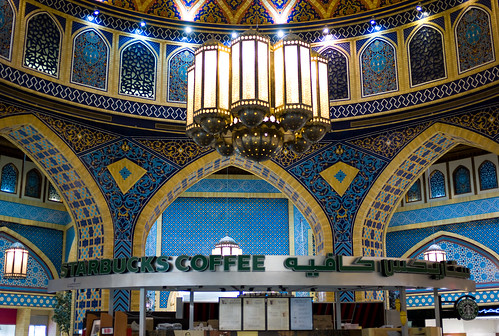
I wasn't going to write a blog post until I had more experience, but I reached the limit of what I can say in 140 character Twitter responses. Everyone has been sending me links to the Guardian article and the article in The Independent about the treatment of workers in Dubai. They come in the wake of an increasing flow of articles bashing Dubai. The New York Times article sort of broke the damn in terms of sensationalizing all of this I think. Just like the Desert Blogger, I've never seen cockroaches coming out of the faucets. ;-P The Desert Blogger has a good response to these articles.
I'm still new to the region so I can't speak definitively as a native, but I do know that the picture that is sketched is pretty biased and I think could be rightly called "bashing". As far as I can tell there is a crunch going on, just like everywhere else, and the government and businesses are trying to figure out what to keep and what to shut down. There are a lot of solid businesses and a lot of solid business people in Dubai and like anywhere else, consolidation and downsizing is taking its toll.
Having said that, the parking lots are not full of homeless foreigners and dumped cars. The mood is the same, if not maybe slightly more upbeat than the US or Japan these days. Instead of taking an hour and a half to get across town, it takes half an hour, instead of 3 days in advance reservations for the lounge/bar at The Address, it's 2 days and you can usually get a table at the nice restaurants with less than a hour wait now... usually. The real estate and development part of Dubai seems to be getting hit the hardest, but it looks the shipping and "the hub of the Middle East" parts of Dubai seem to be doing OK.
I don't want to appear like I'm defending human rights offenders. As a board member of Global Voices, WITNESS and a supporter of a number of Human Rights organizations, I spend a TON of time on human rights issues. We NEED to talk about human rights. However, human rights issues are resolved by understanding how and what kind of pressure to put on who in order to cause the change. While broad understanding of human rights is important, I don't find that sprinkling them on articles as part of a negative press pile-on is really, comparatively speaking, that productive.
The author of the article in The Independent defends his position and says that critics of his article are suffering from 'what-aboutery'. It's not a bad rebuttal, but I'm not sure the article was really intended to try to make things better for those oppressed workers, but rather just to piss on Dubai some more along with everyone else. I didn't see a "what you can do to help" button or mention anywhere in the article. Just a bunch of finger wagging.
In contrast, and as an example (and I'm sure some people will call this what-aboutery), if you look at the WITNESS coverage of the issue of slavery in rural Brazil, it's written as a call to action against this human rights violation.
Fixing human rights violations require people in that country or countries that have influence over that country to speak up. Shouting at people who don't really listen to you anyway, isn't very helpful. In fact in can be counter-productive. That's why Japan needs to speak up about Burma, the Chinese need to speak up about Africa and Americans about things like Guantanamo Bay.
Again, I'm not in favor of censorship, nor am I in favor of ignoring human rights violations. I'm just not super-supportive of not-very-constructive finger-wagging-because-it's-fashionable-right-now journalism. If you care, write about the people who are trying to fix the problems.
When I was in Israel and Palestine recently, I was impressed most by the Palestinians who were trying to cause change in Palestine and the Israelis who were trying to change the way Israelis think. In my 2005 thread about the Anti-Japan protests in China, what impressed me the most were the people who were reflective of their own society's problems after the discussion, not those criticizing their enemies.
I don't want to sound too defensive about Dubai or the Middle East in general, but one thing I've learned from my still brief time is that it's much more complicated than it appears. Just calling Muslim law and governance "medieval" and writing it off is ignorant. It's very different and isn't in sync with what many of us might think is "fair". They treat bounced checks and drug smuggling very seriously. Moving to the Middle East casually and assuming that everything should be just like home is dangerous and I wouldn't recommend it. However, I knew about the drug thing even before I visited and I learned about the "bounced checks land you in jail" thing on my first day.
In summary, I think that if you're looking for fast money or a "rags to riches" dream, I would recommend against going to Dubai. On the other hand, if you're looking for a safe place to park while you explore opportunities or culture in the Middle East, I think Dubai is fine, for now. The food is good, there are great people, the culture is diverse, most of the infrastructure works and the laws are, relatively speaking, friendly to foreigners compared to the rest of the region. That's why I moved there and so far I'm not regretting my decision.
UPDATE: Xeni posted this on Boing Boing and there is a thread of comments there.
UPDATE 2: A followup post.
![Joi Ito [logo]](/_site/img/joi-ito-logo-300.png)









